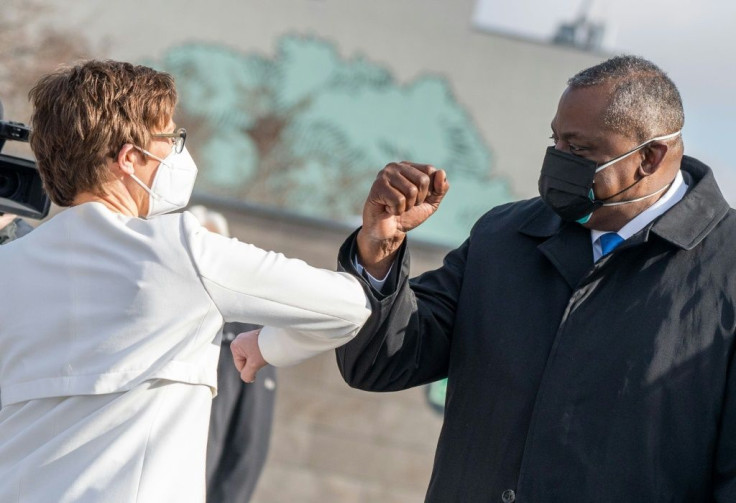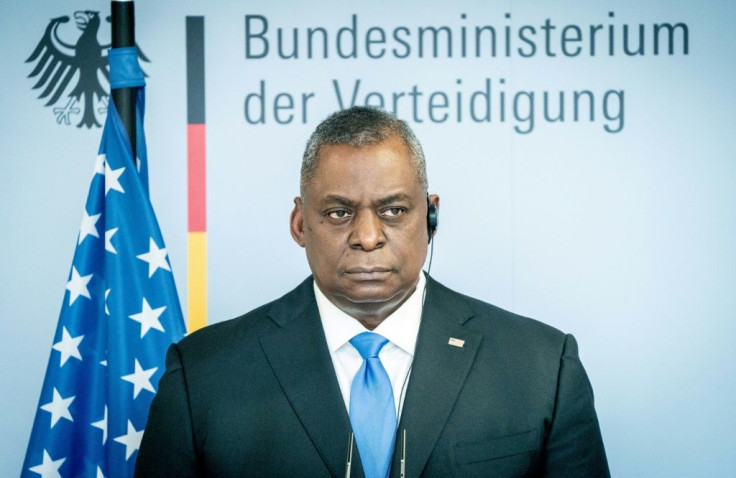US Affirms Germany Ties With Troop Level Boost
The United States will increase troop levels in Germany as part of a commitment to closer ties, Defense Secretary Lloyd Austin said Tuesday on his first official trip to Europe.
After four years of open animosity under Donald Trump, Austin said the Biden administration wanted to put its security cooperation with Germany and NATO on a stronger footing.
He told his German counterpart Annegret Kramp-Karrenbauer that Washington would also not allow a row over the controversial Nord Stream gas pipeline project between Russia and Germany to harm relations.
"Today I am happy to announce that we will be increasing the US force presence in Germany," Austin, the first member of Biden's cabinet to visit Germany, told reporters.
"I briefed the minister on our intention to permanently station approximately 500 additional US personnel in the Wiesbaden area as early as this fall," said the defense secretary, who will also visit NATO headquarters on his European tour.
Trump had moved to reduce the US troop presence in Germany, a cornerstone of NATO security since the start of the Cold War.

Biden's government said in February that it would put those plans for a pullback on hold, in a step warmly welcomed by Berlin.
Austin said the 500 new personnel, which would primarily bolster capabilities for space and cyber security, "speaks for our commitment to our partner and to NATO".
Kramp-Karrenbauer called the announcement "wonderful news" and a "very strong signal of solidarity".
The United States has had troops stationed in Germany since World War II, but their numbers have declined since the fall of the Berlin Wall from around 200,000 soldiers in 1990 to 34,500 today.

Although the prospect had been looming for years, Trump's decision last July to redeploy 12,000 soldiers from Germany still came as a shock, particularly to towns that have built strong economic and cultural ties to the US military.
In a marked change in tone, Austin pledged that Germany would "continue to be an important security and economic partner" for the United States "for the years ahead".
"This is why strengthening our relationship with Germany is a top priority for the Biden-Harris administration," he said.
On the Nord Stream 2 project, which has drawn fierce bipartisan criticism in Washington, Austin offered to ring-fence the dispute.
"We've expressed our opposition to this deal and the influence it will actually give Russia. But we're not going to let that issue get in the way of a tremendous relationship that we have with the country of Germany," he said.
"We're going to continue to work with Germany and the rest of the allies in the region to strengthen our alliances and continue to move forward."
Acknowledging allies' concerns, Kramp-Karrenbauer said that Germany could make the quantity of gas it imports in future from Russia through the pipeline conditional on Moscow's "behaviour".
The 10-billion-euro ($11-billion) pipeline beneath the Baltic Sea is set to double Russian natural-gas shipments to Germany, Europe's largest economy.
The US and several European countries are deeply opposed to the project, arguing that it will increase German and EU dependence on Russia for critical gas supplies.
The pipeline also avoids Ukraine, depriving Kiev of gas transit fees.
The Biden administration has also signalled that it was committed to complying with an anti-Nord Stream law providing for sanctions which was passed in 2019 under Trump.
Despite the intense pressure, Germany has not budged on the project, which it says ensures a more stable and cleaner source of energy as it pivots away from coal and nuclear power.
© Copyright AFP {{Year}}. All rights reserved.




















